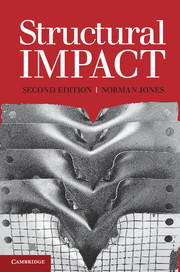Book contents
- Frontmatter
- Contents
- Preface to the Second Edition
- Preface to the First Edition
- Structural Impact
- 1 Static Plastic Behaviour of Beams
- 2 Static Plastic Behaviour of Plates and Shells
- 3 Dynamic Plastic Behaviour of Beams
- 4 Dynamic Plastic Behaviour of Plates
- 5 Dynamic Plastic Behaviour of Shells
- 6 Influence of Transverse Shear and Rotatory Inertia
- 7 Influence of Finite Displacements
- 8 Strain-Rate-Sensitive Behaviour of Materials
- 9 Dynamic Progressive Buckling
- 10 Dynamic Plastic Buckling
- 11 Scaling Laws
- Appendix 1 Principle of Virtual Work
- Appendix 2 Path-Dependence of an Inelastic Material
- Appendix 3 Principle of Virtual Velocities
- Appendix 4 Consistent Sets of Equilibrium Equations and Geometrical Relations
- Appendix 5 Buckingham Π-Theorem
- Appendix 6 Quasi-Static Behaviour
- Appendix 7 Martin’s Upper Bound Displacement Theorem
- References
- Answers to Selected Problems
- Author Index
- Subject Index
2 - Static Plastic Behaviour of Plates and Shells
Published online by Cambridge University Press: 05 June 2012
- Frontmatter
- Contents
- Preface to the Second Edition
- Preface to the First Edition
- Structural Impact
- 1 Static Plastic Behaviour of Beams
- 2 Static Plastic Behaviour of Plates and Shells
- 3 Dynamic Plastic Behaviour of Beams
- 4 Dynamic Plastic Behaviour of Plates
- 5 Dynamic Plastic Behaviour of Shells
- 6 Influence of Transverse Shear and Rotatory Inertia
- 7 Influence of Finite Displacements
- 8 Strain-Rate-Sensitive Behaviour of Materials
- 9 Dynamic Progressive Buckling
- 10 Dynamic Plastic Buckling
- 11 Scaling Laws
- Appendix 1 Principle of Virtual Work
- Appendix 2 Path-Dependence of an Inelastic Material
- Appendix 3 Principle of Virtual Velocities
- Appendix 4 Consistent Sets of Equilibrium Equations and Geometrical Relations
- Appendix 5 Buckingham Π-Theorem
- Appendix 6 Quasi-Static Behaviour
- Appendix 7 Martin’s Upper Bound Displacement Theorem
- References
- Answers to Selected Problems
- Author Index
- Subject Index
Summary
Introduction
An introduction to the static plastic behaviour of beams was presented in the preceding chapter, together with some theoretical solutions for several problems. It was observed that the idealisation of a perfectly plastic material, which is shown in Figures 1.3 and 1.4, is particularly attractive and simplifies considerably any theoretical calculations for the static plastic collapse load of a beam. Moreover, Figure 1.14 shows that the theoretical predictions for the static plastic collapse load give reasonable agreement with the corresponding experimental results on freely supported steel beams subjected to a central concentrated load. Good agreement between experimental results and the corresponding theoretical predictions for the static plastic collapse loads of many beams and frames may be found in the articles cited in the previous chapter.
The general concepts introduced in the previous chapter for beams are now used to study the static plastic collapse behaviour of plates and shells, which are important practical structures found throughout engineering. However, the theoretical analyses are more complex than for beams because the plastic flow in plates and shells is controlled by multi-dimensional yield criteria.
Information
- Type
- Chapter
- Information
- Structural Impact , pp. 21 - 58Publisher: Cambridge University PressPrint publication year: 2011
